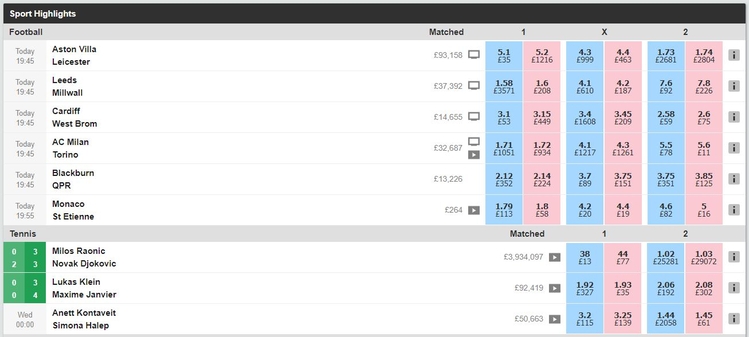 Over time, different generations come up with terms to describe things that happen. In the past, people would simply have said that their bookmaker had decided to limit their account. In the modern vernacular, though, that is called being ‘gubbed’, which is what happens when a bookie decides to put restrictions onto an account.
Over time, different generations come up with terms to describe things that happen. In the past, people would simply have said that their bookmaker had decided to limit their account. In the modern vernacular, though, that is called being ‘gubbed’, which is what happens when a bookie decides to put restrictions onto an account.
They effectively decide to do this when you have been successful with your betting, doing things such as limiting how much you’re allowed to bet or whether or not you are able to take advantage of promotional offers they have.
We can discuss the rights and wrongs of this as much as we like, but it happens. There are numerous reasons why your account may have been gubbed, but in short it is because the bookmaker in question wishes to protect their own assets by not paying you out too much in winnings.
The thing you will probably be most interested in is whether or not there is anything that you can do in order to avoid being gubbed, or whether you can put yourself in a position where you can reverse a gubbing once it has happened to your account.
Gubbing Explained
 In its simplest term, gubbing means having your account restricted by a bookmaker. The manner in which your account is restricted will depend on all sorts of things, including how it is that you’ve been behaving that has caught their attention in the first place.
In its simplest term, gubbing means having your account restricted by a bookmaker. The manner in which your account is restricted will depend on all sorts of things, including how it is that you’ve been behaving that has caught their attention in the first place.
Usually, a bookie moves to gub someone because they have been winning too often, which obviously has all sorts of questions around it in terms of the morality of the situation. Sadly, there is very little that we as punters can do to argue against a gubbing, which is why bookies do it.
The chief way that an account can be gubbed is by limiting your access to promotional offers and free bets. This means that you won’t be able to make use of any offers that companies usually put forward to bettors in order to tempt them into placing more bets.
This isn’t too much of a hardship in essence, but it does mean that you won’t be able to get involved in any processes such as matched betting with that particular bookie. It feels cruel, but it is basically just the bookmaker protecting their own interests by not paying out to serial winners.
Why Accounts Get Gubbed
 In the vast majority of cases, accounts end up being gubbed because a flag has gone up on the bookmaker’s system to suggest that they have been engaging in certain betting strategies. Matched betting is one of the most common of these, which is when you take advantage of an offer or promotion to guarantee yourself a profit in the event that you’re betting on. T
In the vast majority of cases, accounts end up being gubbed because a flag has gone up on the bookmaker’s system to suggest that they have been engaging in certain betting strategies. Matched betting is one of the most common of these, which is when you take advantage of an offer or promotion to guarantee yourself a profit in the event that you’re betting on. T
he likes of arbitrage betting and gnoming are also things that would result in your account being gubbed by a bookie looking to limit their losses and their exposure.
The reality is, though, that you don’t actually need to engage in a betting strategy to be gubbed by a bookmaker. If you win too much money too regularly, the likelihood is that your account will end up being limited by the bookie that you’re winning money from.
If you constantly win and rarely make errors in your betting, sending some money back their way, a bookmaker is unlikely to allow you to keep on betting as you see fit. Ultimately, betting companies are businesses, so if you don’t allow them to make money from you then they won’t want you as a customer.
How To Get Ungubbed
 If you find yourself in a situation where your account has been gubbed, you will no doubt be keen to find out how you can undo that. The reality is that you’re unlikely to be able to, but it has happened so that’s something worth remembering.
If you find yourself in a situation where your account has been gubbed, you will no doubt be keen to find out how you can undo that. The reality is that you’re unlikely to be able to, but it has happened so that’s something worth remembering.
The first thing to note is that it depends entirely on the bookmaker that has gubbed you, given that some of them are more lenient than others. Equally, the type of gubbing that you have fallen foul of will also dictate how easy it is to undo the situation that you’ve found yourself in with your bookie of choice.
In most cases, gubbing involves you not being allowed to receive free bets or take advantage of promotions. Sometimes, though, it is about the bookie restricting your stake to small amounts. One the latter happens, it is very tricky to reverse the situation.
If you have been restricted in terms of stakes you can place, you can leave it for a month or so and then return, placing a series of ‘mug’ bets that are as good as guaranteed to lose. This will allow the betting operator to see that you don’t always win, so it might be worth their while to allow you to lose more.
If it is just that you’ve been stopped from taking advantage of promotions, the same sort of approach might work. You are effectively trying to show the traders at the bookmaker that you use that you haven’t been matched betting, so there is no need for them to gub your account.
They might choose to remove restrictions, but the likelihood is that they will leave them in place for a while longer, waiting to see if you keep on losing more bets than you win or whether you were just mug betting to get the restrictions lifted.
The best solution really is to just move on and choose another site, there are plenty out there. Alternatively use an Exchange to bet.
How To Not Be Gubbed In The First Place
 Given the difficulty of getting your betting account ‘ungubbed’, the most simplistic thing to is to not get gubbed in the first place. That, of course, is much easier said than done. Once again, though, that word ‘mug’ comes into play, given that you’ll need to place some mug bets in order to persuade your bookmaker that the winning bets that you have are the uncommon things and you lose more often than you win. Just because you’re engaged in mug betting doesn’t mean that you can’t do so sensibly, though, so that’s how to think.
Given the difficulty of getting your betting account ‘ungubbed’, the most simplistic thing to is to not get gubbed in the first place. That, of course, is much easier said than done. Once again, though, that word ‘mug’ comes into play, given that you’ll need to place some mug bets in order to persuade your bookmaker that the winning bets that you have are the uncommon things and you lose more often than you win. Just because you’re engaged in mug betting doesn’t mean that you can’t do so sensibly, though, so that’s how to think.
A good mug bettor will regularly bet on a solid mixture of high-profile events, from things like Premier League matches to tennis or golf tournaments. Mixing up your stakes is another solid way to suggest that you’re far from a professional punter and are instead just a normal bettor that wins and loses in equal amount.
In most cases, bookmakers look out for accounts that are set up in a way that takes money from them without giving them a sniff of making it back. As long as you’re not doing that, the chances are that you’ll be fine.
When you engage in the likes of matched betting, the way that you get to ensure you earn a profit is by placing very specific bets. Something like £17.32, say. That is the kind of wager that will be flagged up by bookmakers as suspicious, meaning that your betting history will likely be looked at.
If you avoid such a situation by regularly betting in full amounts, you will be much less likely to come up as an issue for the bookie that you use the most often. It might mean a loss in profit for your matched betting, but it should mean not being gubbed.
Using The Exchange

The way exchanges work is such that there is no reason for the companies that run them to look to gub your account. They act as nothing more than a facilitator, accepting your bet against another person and taking a percentage from the winner.
As a result, they make money from you placing bets with them whether you win or lose and regardless of whether you’re betting in a weird manner. If you place wagers with specific stakes because you’re looking to take advantage of a arbing or matched betting opportunity, the betting exchange company couldn’t care less.
Of course, the downside to using the exchange is that you tend to get significantly fewer offers from those sorts of companies. The reason they won’t look to gub your account is that the likelihood of you abusing an offer or promotion is slim to nil.
Indeed, those that are taking advantage of such offers from traditional fixed-odds sportsbooks do so by placing their other bets on an exchange. It is disappointing to not take advantage of offers and promotions, but if that is the sacrifice that you need to make in order to avoid having your account gubbed, it is worth it. Plus exchanges notoriously have better odds than fixed odds books anyway.
The one thing to flag up here is that betting on the exchange can be complicated if it’s something that you haven’t really done before. The notion of Laying and Backing might seem like gobbledygook when you first read about it. I
t is important to ensure that you know what it is that you’re doing if you’re hoping to avoid such a situation from developing, given the fact that there is no point in avoiding being gubbed only to end up losing large amounts of money because you didn’t realise what it was that you were engaging with.
